Oat Milk vs. Almond Milk: Which Drink Does a Dietitian Say Is Healthier?
Both almond milk and oat milk come with their own unique perks and pitfalls; if you're trying to choose between the two, it helps to be familiar with both. To that end, we spoke with registered dietitians Lauren Harris-Pincus, RD, and Esther Blum, RD, to, uh, milk them for everything they know about the two types of alternative milks. Nutrition, sustainability, versatility...we talked about it all, including why someone would opt for plant-based milk in the first place.
- Esther Blum, RD, Connecticut-based registered dietitian, certified nutrition specialist, and menopause expert
- Lauren Harris-Pincus, MS, RDN, registered dietitian and founder of Nutrition Starring You
- Sharon Palmer, RD, registered dietitian nutritionist and author of The Plant-Powered Diet
"Many people are moving toward a plant-based lifestyle for either a way to consume more plants or as a way to be more environmentally-conscious," Harris-Pincus says. She explains that while cow's milk is healthy for many people, it may not be as good for the environment since raising cows requires a lot of land, and cows themselves produce methane gas. (Plus, for folks who are allergic to dairy or have a sensitivity, milk is just off the table, period.)
But back to the oat milk vs. almond milk battle. As registered dietitians, there are certain qualities Harris-Pincus and Blum like about oat milk and certain ones they like about almond milk. Keep reading for their verdict.
{{post.sponsorText}}
What are the key nutritional differences between oat milk and almond milk?
The biggest (and most obvious) difference between oat milk and almond milk is that one is made with oats and the other with almonds. Although they both have a milk-like consistency and can be used in place of regular milk, they’re not actually milk. “Plant milks are really milk alternatives and not truly milk, which comes from the udder of a cow, goat or sheep,” Blum says. However, plant-based milks are a good, healthy option for those who have milk allergies or are lactose intolerant. “Plant milks are typically lower in saturated fat and calories than cow's milk and provide some of the nutritional benefits of the whole plants themselves,” Blum adds.
As for oat milk and almond milk, in particular, Harris-Pincus says that both wear health halos that are more hype than they actually deserve. "Both milks are primarily made of water; the amount of oats or almonds that is used is actually quite low," she says. "Most oat and almond milks are fortified with vitamins A, D, B2, and B12—a positive they both have in common," Harris-Pincus adds. "These are nutrients that are found in cow's milk and other animal products, so it's beneficial they are added to these vegan milks as some people on a plant-based diet may not be getting enough of these nutrients," she says. Especially when scoping out a plant-based milk for longevity.
That said, both have some unique benefits that make them worthwhile to drink (and use up before they turn into spoiled milk), depending on your tastes and health needs. And, in case you were asking yourself, does almond milk go bad, the answer is yes. But they're not alone. That's to say, you should also be mindful of the oat milk expiration date listed on the carton, too.
What are the benefits of oat milk?
1. It's closer in consistency and taste to cow's milk
Now, let's delve into all of the oat milk nutritional benefits. Harris-Pincus points out that the major reason oat milk is so popular actually has nothing to do with nutrition, but with taste: It's the closest vegan alternative to cow's milk in terms of flavor and consistency you'll find. While almond milk can be quite watery, oat milk tends to be a bit thicker, which makes it especially beneficial in lattes and baking.
2. It may be more sustainable than almond milk
So: which is more environmentally sustainable, oat milk or almond milk? It's not so simple, yet it appears that oat milk may win the battle by a small margin. Another reason Harris-Pincus says some may opt for oat milk over almond milk is because it’s a more sustainable nut milk. "It requires a lot of water to produce almonds," she says. Indeed, research has shown that almond milk requires the most water to produce1 compared to oat, soy, and rice milks. “Only a small portion of almonds are required to make almond milk, but almond trees require significant amounts of water,” Sharon Palmer, MSFS, RDN, previously told Well+Good. But she also pointed out that almond milk requires less land than oat milk, making it better in terms of emissions. Neither alt-milk is perfect when it comes to sustainability, but oat milk may be a slightly more eco-friendly pick. Although they're both better than the environmental impact of milk from cows.
3. Oat milk has trace amounts of fiber
Again, while oats themselves have lots of nutritional benefits, very few of those translate over to oat milk benefits since the beverage is largely made of water. But oat milk does contain fiber and a little bit of protein, two nutritional positives.
What are the disadvantages of oat milk?
While oat milk does have its pros, it also comes with some potential cons. For starters, Blum notes that oats tend to be high in mold, which can make you ill if ingested. Then, nutritionally speaking, oat milk also has a little less calcium per serving compared to almond milk (350 milligrams of calcium for oat milk, and 450 milligrams of calcium for almond milk per eight-ounce serving).
And, Blum adds, unless the oats used are gluten-free, oat milk can cause gas and GI-related irritation for folks with gluten sensitivities. “Oats don’t technically contain gluten but they’re often processed in a facility where gluten exposures can occur,” she says. “And although it is true that many packaged grain products are cross-contaminated, non-cross contaminated oats have also been shown to cause an inflammatory reaction in patients diagnosed with gluten intolerance," Blum says.
Furthermore, it’s also worth noting that some experts say oat milk is less likely to cause digestive issues compared to almond milk.
What are the benefits of almond milk?
1. Almonds are higher in protein and vitamin E than oats
It bears repeating that, like oat milk, almond milk is primarily made of water and the nutrient density is low. But Harris-Pincus says almonds, as a food, are higher in protein and vitamin E than oats, and contain trace amounts of those nutrients. Almond milk also tends to be lower in sugar than most oat milk products. She also reiterates that, like oat milk, it tends to be fortified with vitamins A, D, B2, and B12—important nutrients for everyone and ones plant-based eaters specifically should be mindful of as animal-based products tend to be the primary sources for obtaining them.
2. It's higher in healthy fats
When comparing almonds to oats, almonds are also higher in monounsaturated fats, which are extremely beneficial for brain health. Again, Harris-Pincus says that almond milk isn't exactly going to be a powerhouse source, but every little bit counts.
3. Almond milk is lower in calories than oat milk
For those who are actively seeking to manage their weight, Harris-Pincus says almond milk may be a better alternative milk choice because it's much lower in calories than oat milk. For example, a cup of unsweetened Silk oat milk has 60 calories while a cup of unsweetened almond milk by the same brand has 30 calories. Of course, this all depends on which product you purchase.
What are the disadvantages of almond milk?
In addition to not being the most eco-friendly nut milk, another big con of almond milk is that they tend to contain additives, depending on the brand. “Almond milks also have added gums like xanthan gums or carrageenan,” Blum says, which can irritate and inflame the lining of the gut for some folks2. “So be mindful and read the labels before you buy if gums tend to upset your gut.”
Blum also notes that in theory, “consuming almonds in large amounts can potentially suppress thyroid function because they interfere with iodine uptake. However, this claim has yet to be supported by clinical research studies.”
What factors should you consider when deciding between oat milk and almond milk?
Since the nutritional content is quite low for both, Harris-Pincus recommends making the decision for which one to go for on which one you like the taste and texture of more. There are also some general tips to keep in mind when shopping. "Choose an unsweetened option, as that will be lower in sugar," she says. Also, if you are sensitive to aforementioned gums—which are used for blending and consistency—that is something to be mindful of, too. "For most people they're harmless, but some people do have a sensitivity," Harris-Pincus says. Of course, you can learn make oat milk at home or almond milk from scratch, to ensure you know exactly what's in it.
Blum adds that when it comes to the oat milk vs almond milk debate, neither is necessarily better than the other. The best option comes down to your personal preference for taste and texture, as Harris-Pincus mentioned, as well as your needs and goals. And again, if your top criteria for deciding between oat milk vs almond milk is sustainability, oat milk is (marginally) the better pick.
What other non-dairy milk options are there, and how do they compare?
All that said, oat milk and almond milk are not the only alt-milks on the market. There are definitely lots to choose from. If you are looking to try other options, Blum recommends flax and hemp milk as alternatives, which are both sustainable dairy-free milk options that are available at most grocery stores and relatively easy to make at home.
Nutrition-wise, here’s how they stack up: “Flax milk provides 1,200 milligrams of omega-3s. It has as much calcium as cow’s milk and is usually enriched with calcium & vitamins A, D, and B12. It’s also low calorie at 50 cals per serving,” Blum says. “Hemp milk is higher in calories, with 150 per eight-ounce serving and carbs nine grams of sugar per serving, though it also has seven grams of protein.”
As for the healthiest nut milk, Blum points to coconut milk. “Coconut oil is rich in lauric acid which is antiviral and immune-boosting,” she says. “Lauric acid is also easy to digest, bypassing the liver for absorption.”
That said, this may surprise you but if Blum had to pick the best milk for overall health, she would go with regular dairy milk (with a few contingencies). “If you can find real whole milk from cows raised on pasture, and you tolerate dairy, it's a far more sustainable and healthy choice in the long run when it comes to optimizing protein intake and nutrition,” she says. “Raw goat’s milk is another excellent choice and is much easier on the digestive tract.”
Below are three oat milk and three almond milk picks, all of which are unsweetened, have simple ingredients, and are fortified—keeping with Harris-Pincus's advice of what to look for.
6 Oat Milks and Almond Milks To Try
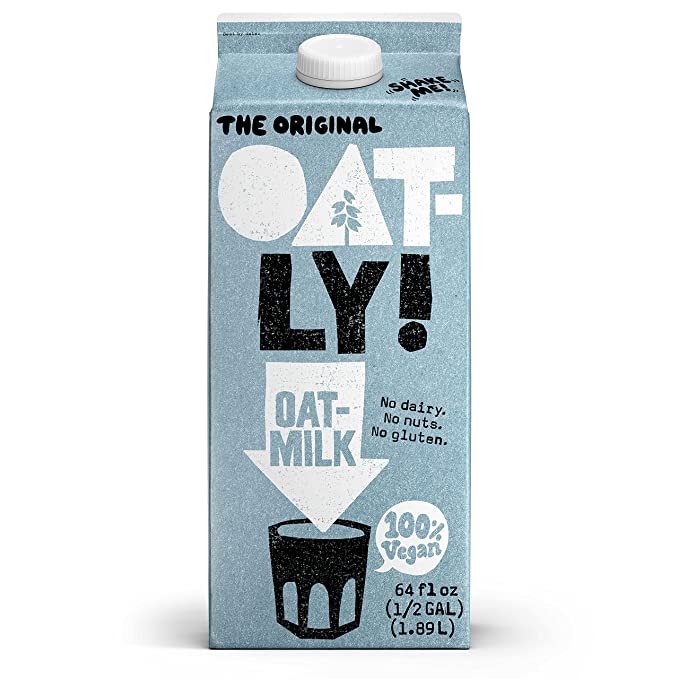
It’s a cult favorite for a reason: Oatly’s OG oat milk has a short, simple ingredients list and is beloved by many for its taste and texture.
Pros
- No dairy No nuts No gluten
Cons
- Contains a few added ingredients
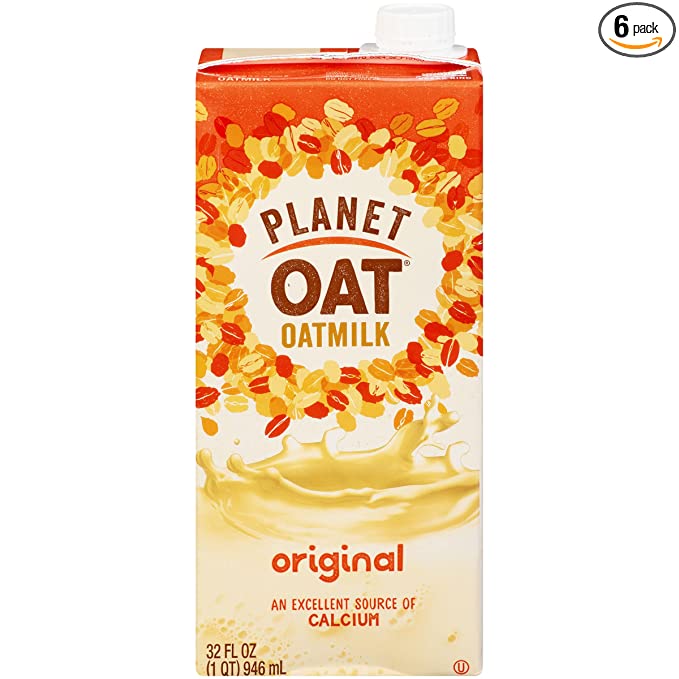
Planet Oat is popping up in more stores and cafes—and it’s one of the most inexpensive oat milks you’ll find. But that doesn’t mean you’re sacrificing on ingredients or taste; it’s a win all around.
Pros
- Affordability Good source of calcium
Cons
- Contains a few added ingredients
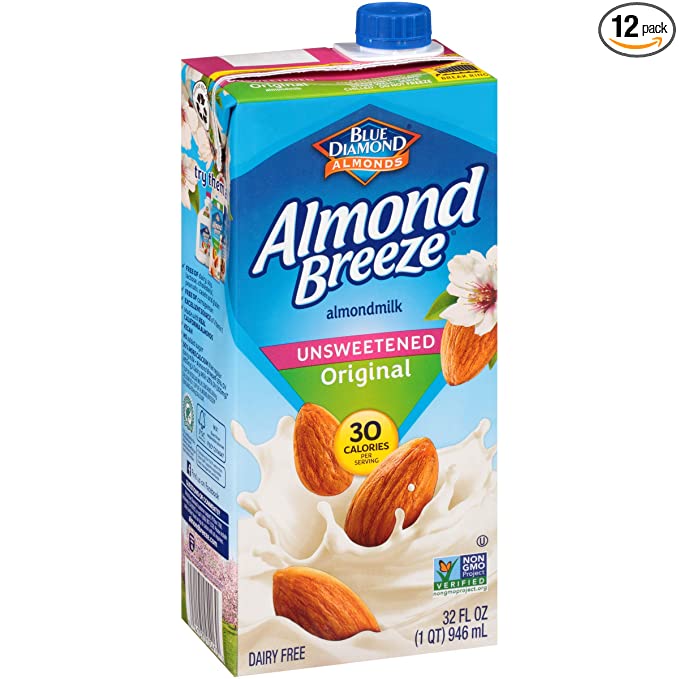
Almond Breeze is one of the tried-and-true almond milk brands and this one from their line has zero sugar whatsoever, making it a standout for health-conscious shoppers.
Pros
- Affordability Unsweetened
Cons
- Contains a few added ingredients
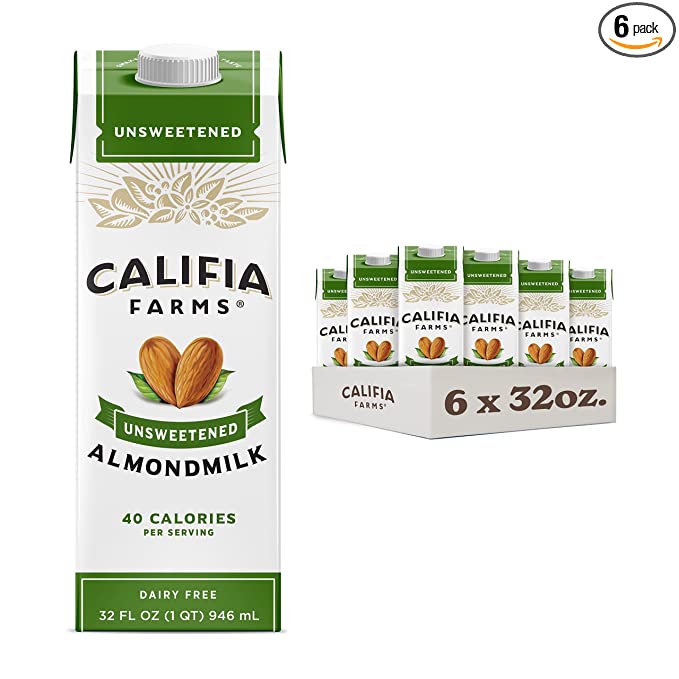
Made from non-GMO almonds and completely free of carrageenan, an emulsifier that can cause digestive upset in some people, this almond milk is pretty close to what you would make at home (but fortified).
Pros
- Made from non-GMO almonds Carrageenan-Free Kosher Gluten-free
Cons
- Not as creamy as oat milk
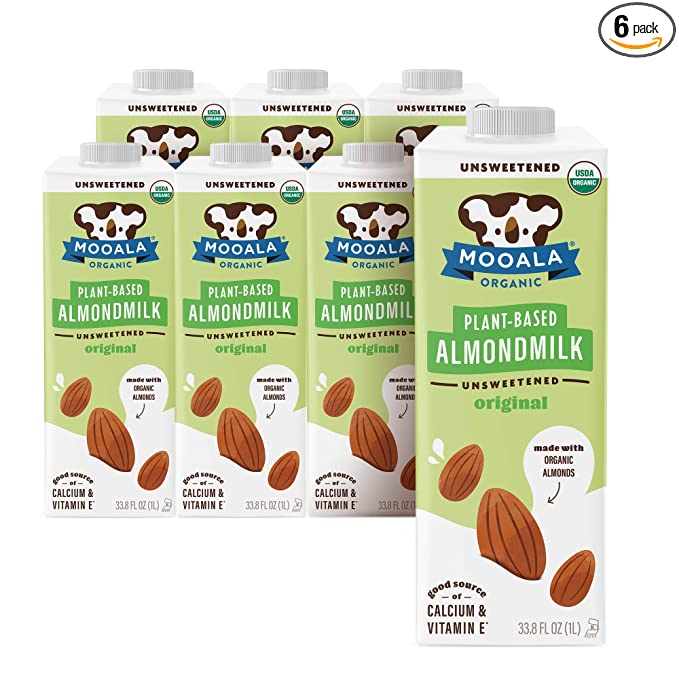
Dairy-free plant milk brand Moola supports non-profit microfinance organizations in impoverished countries, and is USDA Organic. Like the others on this list, it’s fortified and has less than one gram of sugar.
Pros
- Made from organic almonds Fortified with essential vitamins and nutrients Organic
Cons
- Expensive Limited flavor options
TL;DR?
In the great oat milk vs. almond milk debate, what's most important is to choose a beverage you like. Otherwise, it's going to sit in the fridge unused. "It's more important to choose an alt-milk that's unsweetened than choosing between oats and almonds," Harris-Pincus says. And hey, if you don't like either one, there are plenty of other options to choose from.
Watch the video below to learn more about the nutritional pros and cons of oat milk:
- Poore, J, and T Nemecek. “Reducing food’s environmental impacts through producers and consumers.” Science (New York, N.Y.) vol. 360,6392 (2018): 987-992. doi:10.1126/science.aaq0216
- Borsani, Barbara et al. “The Role of Carrageenan in Inflammatory Bowel Diseases and Allergic Reactions: Where Do We Stand?.” Nutrients vol. 13,10 3402. 27 Sep. 2021, doi:10.3390/nu13103402
- Bačėninaitė D, Džermeikaitė K, Antanaitis R. Global Warming and Dairy Cattle: How to Control and Reduce Methane Emission. Animals (Basel). 2022 Oct 6;12(19):2687. doi: 10.3390/ani12192687. PMID: 36230428; PMCID: PMC9559257.
Loading More Posts...